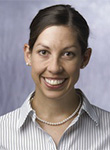Checking in on Foursquare can make new friends
By Bill Steele

One way to keep from feeling lost and alone in a new city is to connect with the people who share your favorite places, and modern technology is making that much easier. According to new Cornell research, the popular smartphone app Foursquare is making public spaces into shared communities.
“Places really do matter to people,” said Lee Humphreys, assistant professor of communication, “but the real story is about connection with others. These technologies can be used to help people: If you have just moved to a new place, you can end up meeting people through the technology.”
Humphreys and graduate student Tony Liao interviewed active users of Foursquare, which lets users tell a network of friends where they are. They found that the technology changes the way people experience a place, and makes public spaces into “parochial” spaces that feel like they belong to a special group. And that in turn encourages social connections. They reported their results in the Nov. 4 edition of the open-access journal First Monday.
The work is part of a growing interest in how technology is changing human behavior. The researchers acknowledge a debt to University of California, Davis, sociologist Lyn Lofland, who has suggested that in an urban setting teeming with strangers, we often form connections with “friendly strangers” whom we meet regularly in the places we like to visit.
More and more people now go online for the first time with a mobile device, the researchers noted, and this may change the way we use social media. “We didn’t used to call each other – we called each other’s houses,” Humphreys explained. And now, “where you are is a stand-in for what you’re doing.”
With Foursquare, users “check in” when they visit a location like a restaurant, workplace, hair salon, library or gym. The app includes a gaming element: Whoever has checked in the most times over the last two months becomes “mayor” of a place. Users also can earn badges or points for various activities, like discovering a new place. These are “public” spaces, where anyone can go, but through Foursquare people can claim a sort of ownership.
In interviews, many users reported that Foursquare stimulated their curiosity about others who had checked into the same place, so they would look up profiles and sometimes try to identify those people. One of the interview subjects found his girlfriend through Foursquare. She was impressed, he said, because “everywhere she went I was the mayor of that place.”
Seeing that someone was mayor of a place could offer an excuse to start a conversation. People competing for mayorships sometimes became friends – and sometimes friendly enemies. Heated competitions for a mayorship could produce accusations of cheating: The opponent might be accused of just showing up long enough to check in. These competitions, the researchers noted, seem to reflect humans’ natural territoriality. Claiming a place confers power, they said.
The researchers cautioned that their study focused on highly active Foursquare users – they interviewed only mayors. “These are early adopters,” Humphreys said, “very interested in being on the cutting edge, interested in a new bar or a new show.” Further research should try to confirm the findings with less active users, they suggested. They also plan to interview owners of businesses that become sites on Foursquare to find out what they do to encourage users. Foursquare may help build traffic, and businesses respond by advertising on Foursquare.
So, someone hunched over a phone isn’t necessarily isolated from human contact, but might just be setting off on a road to new friendships.
Media Contact
Get Cornell news delivered right to your inbox.
Subscribe